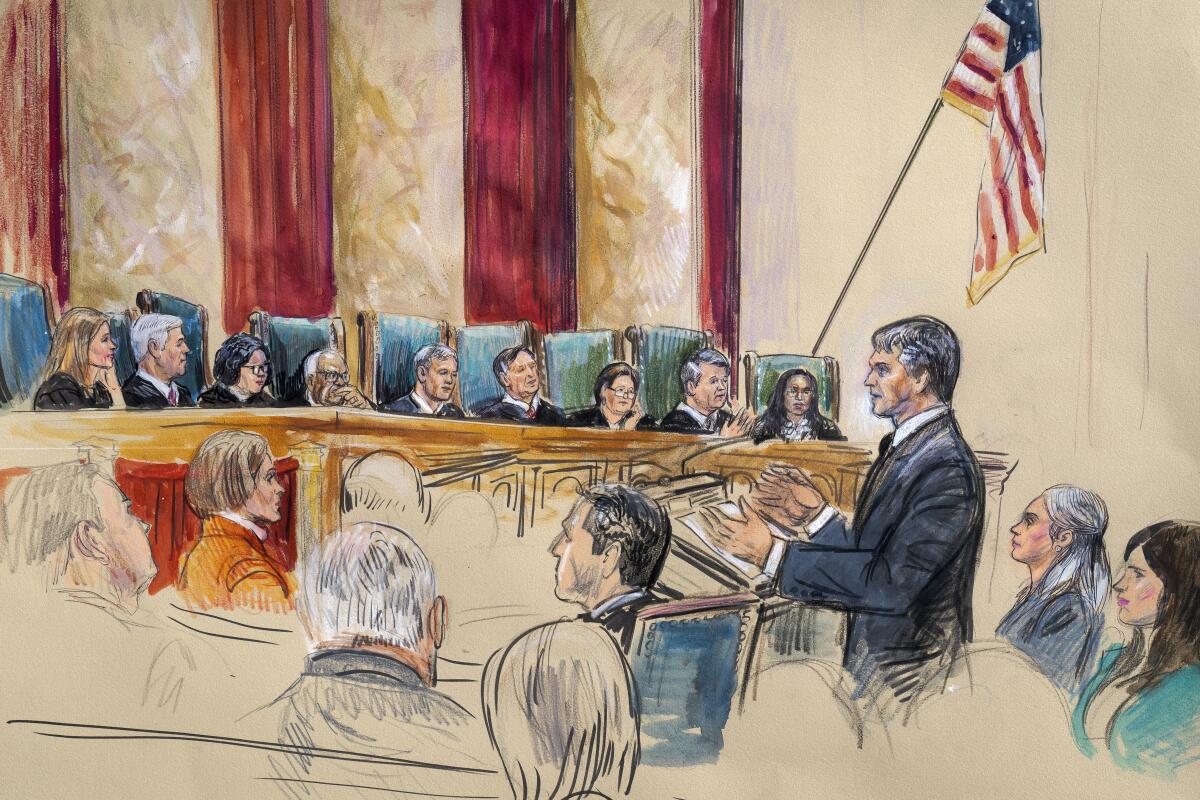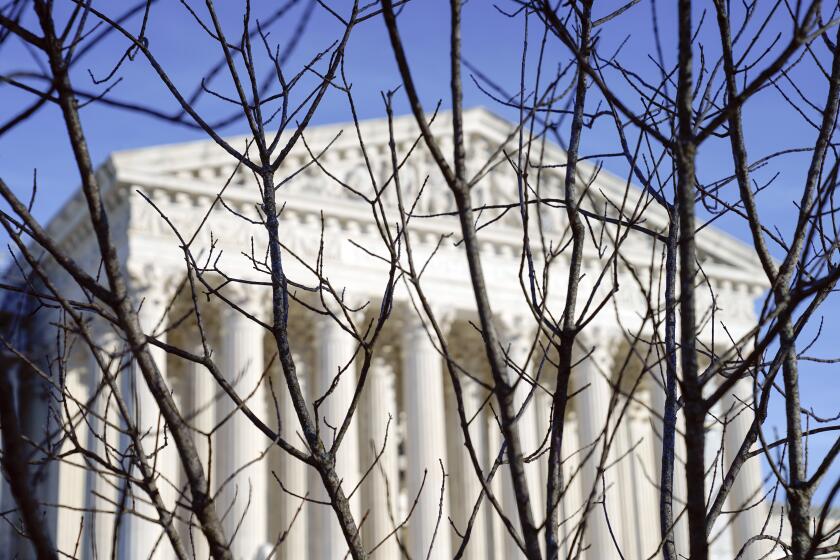Opinion: The Supreme Court seems likely to let Trump run. It will have to ignore the Constitution

Two seemingly contradictory impressions emerged from almost three hours of oral argument Thursday before the Supreme Court: The case for Donald Trump’s eligibility to be president again was quite weak, but the Supreme Court is likely to rule in his favor.
Based on the questions raised by the justices, it’s hard to imagine five of them agreeing with Colorado’s decision to prohibit Trump from running for president as an insurrectionist under the 14th Amendment.
The issue before the court is whether Trump is disqualified from the presidency by Section 3 of the amendment, which provides that no officeholder who “engaged in insurrection or rebellion against” the country “shall be a Senator or Representative in Congress, or elector of President and Vice-President, or hold any office, civil or military, under the United States.”
The justices may want to reverse the Colorado decision disqualifying the former president for insurrection under the 14th Amendment, but it won’t be easy.
The oral argument focused primarily on three questions. First, does Section 3 require a statute passed by Congress to be enforced? Several of the justices indicated support for the view that the provision is not “self-executing” and can’t be enforced without a federal law. Justice Brett M. Kavanaugh, for example, said the “original public meaning” was that a statute is necessary to apply the section.
This argument is seriously flawed. To begin with, the provision doesn’t need a law to enforce it any more than the other constitutional presidential qualifications do, among them being at least 35 years old, a natural-born citizen and not having already served two terms.
In addition, the amendment clearly defines Congress’ role here: Its last sentence gives lawmakers the power to exempt an insurrectionist from the provision. But the amendment does not require congressional action to enforce the section.
The amendment’s Section 3 bars officials who betray the government from holding office again. Trying to keep the elected president out of office by force counts by any standard.
Importantly, the Supreme Court in 1883 declared that the 14th Amendment is “undoubtedly self-executing without any ancillary legislation.” The primary authority to the contrary, relied on by Trump lawyer Jonathan Mitchell and invoked by Kavanaugh, is not a Supreme Court decision but an 1869 opinion by Chief Justice Salmon Chase for a lower appellate court. As Justice Sonia Sotomayor pointed out, Chase later reached the opposite conclusion, finding that no statute was required for disqualification and that Jefferson Davis, the president of the Confederacy, was clearly disqualified from serving as president of the United States.
A second question that featured prominently in the oral argument is whether Section 3 applies to the president of the United States or only to other federal offices. Despite being ideological opposites, Justices Neil M. Gorsuch and Ketanji Brown Jackson both focused on the section’s listing of several offices without mentioning the president.
The problem with this argument is that Section 3 also says “any office, civil or military.” The Constitution repeatedly refers to the president as an officer. As the Colorado Supreme Court explained, senators, representatives and electors are listed as members of elected bodies who are not considered officers under the Constitution. But the president is an officer of the United States included in the phrase “any office.”
The court’s conservatives pride themselves on adhering to the original meaning of the Constitution, and those who drafted and ratified the 14th Amendment unquestionably saw Section 3 as applying to the president. This was explicitly stated on the floor of the Senate.
Gorsuch also noted during the argument that Section 3 precludes insurrectionists only from being president, not from running for the office. But that is an absurd distinction that could lead to dealing with whether Trump is disqualified only after he is elected, a nightmare scenario.
The third question to occupy much of the argument is whether Trump in fact participated in an insurrection. Justice Samuel A. Alito Jr. questioned the evidence for that, while Kavanaugh noted that the former president hasn’t been convicted of insurrection. But a Colorado court held a five-day hearing on that question in which Trump could have testified, after which the judge concluded that he had indeed participated in an insurrection. And nothing in Section 3 or its history requires a criminal conviction.
Another pair from different ends of the court’s ideological spectrum, Justices Elena Kagan and Amy Coney Barrett, wondered whether one state court should be able to make such a determination. But every case must begin in one state. Ultimately, this is not a question of one state deciding so much as it is the United States Supreme Court looking at the facts and the law — as courts always do — and deciding whether Section 3 disqualifies Trump.
This case provides the court with an opportunity to show that it follows the law and the facts, not just the political preferences of the justices. My sense from the oral argument is that we will have reason to be disappointed once more on that score.
I hope I am wrong. If the court ignores the clear language and meaning of the 14th Amendment, it will be a loss for the Constitution and the country.
Erwin Chemerinsky is a contributing writer to Opinion and the dean of the UC Berkeley School of Law. His latest book is “Worse Than Nothing: The Dangerous Fallacy of Originalism.”
More to Read
A cure for the common opinion
Get thought-provoking perspectives with our weekly newsletter.
You may occasionally receive promotional content from the Los Angeles Times.












